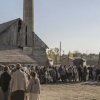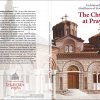Film je odabrala komisija u sastavu Dobrivoje Tanasijević – Dan Tana (član Američke akademije filmske umetnosti i nauke, član komisije po predlogu FCS-a) Miroslav Lekić (ispred Udruženja filmskih umetnika Srbije), dr Ivana Kronja i Tanja Bošković (po predlogu AFUN-a), Sandra Perović (ispred Upravnog odbora FCS-a), Dara Džokić (ispred Udruženja filmskih glumaca Srbije) i Dejan Lutkić (po predlogu FCS-a).
„Komisija izražava veliko zadovoljstvo, jer smo ove godine imali izuzetno kvalitetnu, žanrovski raznoliku filmsku ponudu. Izabrani film „Dara iz Jasenovca“ je emotivno snažna drama koja se bavi istorijskom traumom nudeći pre svega poštovanje prema žrtvama. Tema je izuzetno značajna, bolna i traumatična, pri čemu je film izbegao zamku da se ponovo probude aveti prošlosti jer nije stavljen u politički diskurs. Tragične okolnosti nisu predočene u kontekstu opšteg zločina, već je tragedija personalizovana. Zločin ima svoje ime i prezime, tako da se film ne bavi brojkama i opštim mestima, već pojedinačnim sudbinama, stvarajući na taj način veoma sugestivnu sliku tragedije koja se dogodila. Bila je potrebna velika hrabrost celokupne autorske ekipe da se prihvati tako delikatne teme“, navedeno je u obrazloženju odluke komisije.
Članovi komisije ističu visok umetnički kvalitet filma, vrsnu režiju, britak scenario, fotografiju koja doprinosi vizuelnoj poetici filma, muziku, scenografiju i kostim, kao i ekspresivnu glumu postignutu u ovom „ansambl filmu“ (naročito kada je reč o ženskim likovima). Kroz sudbinu čitavih porodica, prikazana je snaga volje malog čoveka, kao i ogromna ljubav i čovečnost u okolnostima koje su teško zamislive.
Izvor: Danas






